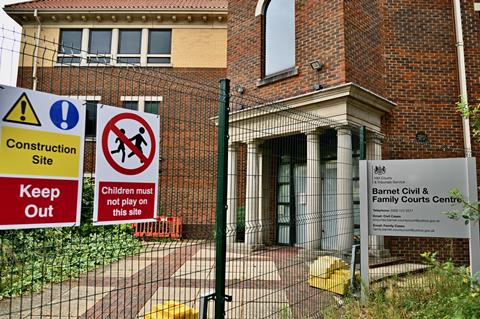The centralisation of civil justice operations has had a 'devastating impact' on justice and caused 'debilitating delays for all parties', MPs say today in a coruscating report on the county court system. The ‘dysfunctional’ court has failed adequately to deliver civil justice across England and Wales, the House of Commons justice committtee concludes. It calls for an ‘urgent and comprehensive root-and-branch’ review to address systemic delays and entrenched inefficiencies.
In a 67-page report on the work of the county court, the committee concludes that the 'Cinderella service' of the justice system is 'beset by delays as a result of a failed attempt at digital reform, recruitment and retention issues, and a complex and diysfunctional patchwork of of outdated and paper-based and digital systems'.
While reviews are currently underway into both sentencing and the criminal courts, there is a ‘fundamental absence’ of any equivalent process for civil justice, despite it being the part of the system most frequently encountered by individuals and small businesses, the committee observes. Improving the court must become a key priority of the ministry of justice given the ‘unacceptable and increasing delays across nearly all types of claims’.

The report is particularly critical of the £1bn courts reform programme, describing it as 'over-ambitious and ultimately under-delivered'. The MPs found 'very difficult to understand' why the court still relies on paper files, noting that in 24/25 the service consumed 76,545 reams of paper, costing £378,000. Paper is a serious cause of delays in hearing cases - an average 423 days in the southeast.
HMCTS must develop a manageable programme to reduce the delays to pre-2015 levels by the end of this parliament, the report states.
Meanwhile the court estate is in a state of 'significant disrepair' following years of chronic underinvestment. Conditions have hit staff and judicial morale, with extensive examples of poor court maintenance, including 'concerning instances of asbestos and rat infestations'.
HMCTS must publish a detailed breakdown of how it spent the £220 million in capital funding it was allocated by the last government between 2023 and 2025. Works to increase the accessibility of the court estate should be prioritised.
Another concern is the current practice of block listing, which 'negatively impacts court users' including legal practitioners, the report states. It urges HMCTS and the judiciary to work together to ensure over-listing is minimised.
Judicial capacity and staffing remain in critsis, the report states. It recommends that the review into the court must include an in-depth assessment of the recruitment and retention crisis. Meanwhile it urges the MoJ and Civil Justice Council to publish accessible guidance for litigants in person.
Communications difficulties were a recurring theme of submissions to the inquiry. The report says that the centralisation of court operations since the Crime and Courts Act 2013 has had a devastating impact on the delivery of justice, entrenching the postcode lottery and resulting in debilitating delays for all parties. The report states bluntly: 'The current methods of contacting a county court do not work.' It calls on the Civil National Business Centre in Northampton to be integrated with local court case management systems to improve coordination and responsiveness.
Committee chair Andy Slaughter said: 'With over a million claims each year and a vast jurisdiction, the county court is where most citizens and businesses encounter the justice system, yet it is beset by unacceptable delays, recruitment and retention issues across frontline staff and the judiciary, and a complex patchwork of paper-based and digital systems.'
Read more
While blaming the situation on 'years of underfunding', Slaughter said it is unclear how HMCTS and MoJ intend to address the situation. 'Justice delayed is justice denied,' Slaughter said. 'The justice committee recommends an urgent and comprehensive, root-and-branch review of the county court launched by Spring 2026 to establish a sustainable plan for reducing the systemic delays and inefficiencies entrenched across its operations. It is not tenable to continue without fundamental reform.'
Law Society president Richard Atkinson agreed with the committee's assessment: 'County courts provide a vital public service for communities and businesses of all sizes. But right now, the wheels of justice are turning too slowly, causing backlogs that have a devastating impact on the people caught in them. Recent reforms have not worked. Over 50% of solicitors we surveyed do not believe that the new online portals are effective in delivering justice, with the main impact being delays to the wider justice system.'
Atkinson called for urgent investment in buildings and technology, along with civil legal aid. 'If the government properly funded our courts and those who work in them, thousands of people would be freed from the legal limbo caused by long waits,' he said.
This article is now closed for comment.



























30 Readers' comments